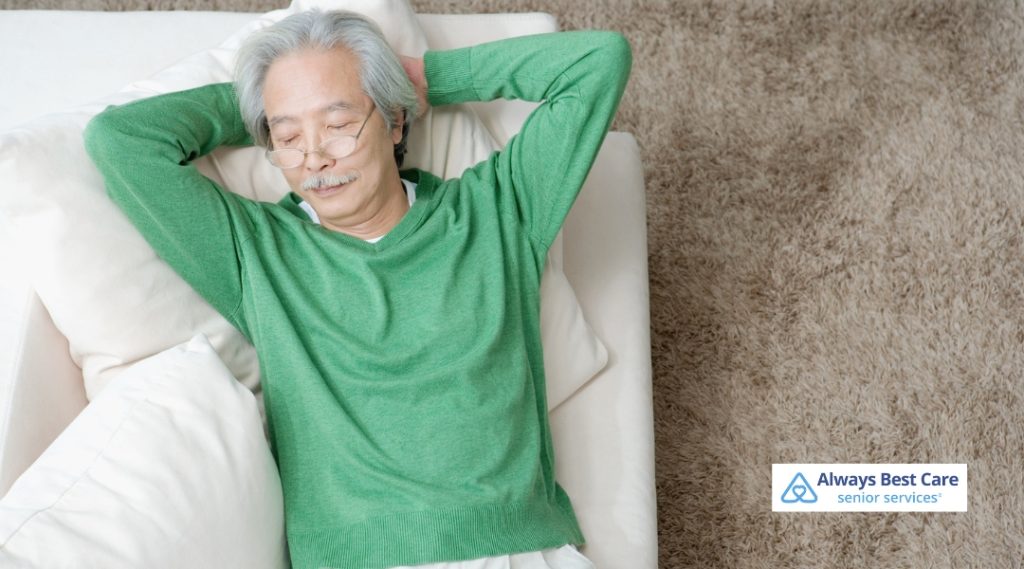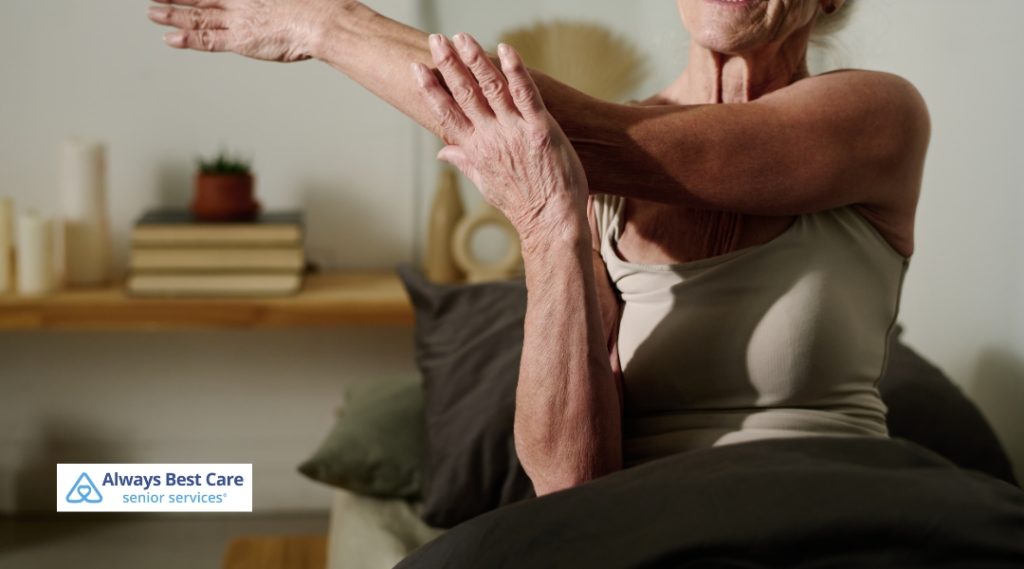How to Sleep Through the Night: Practical Advice for Restless Seniors in Manchester, CT

Tossing and turning. Staring at the ceiling. Watching the hours pass on the clock. For many seniors in Manchester, CT, nighttime can feel anything but restful.
As we age, it’s common to experience changes in sleep—waking up more often, struggling to fall back asleep, or feeling wide awake too early. But just because sleep becomes more elusive doesn’t mean it’s out of reach.
With a few simple adjustments, personalized routines, and the support of in-home care from a trusted provider like Always Best Care, restful nights and refreshed mornings can become part of everyday life again.
Table of Contents
Why Many Seniors Struggle to Sleep Through the Night
Sleep often becomes lighter and more fragmented with age, leaving many older adults waking up multiple times during the night. The body’s natural production of melatonin—the hormone that promotes sleep—declines over time, making it harder to fall asleep and stay asleep.
Age-related health issues such as arthritis, heart conditions, or frequent nighttime urination can also interrupt rest.
Emotional changes like loneliness, anxiety, or grief can further complicate nighttime peace, especially for those living alone. Recognizing these common sleep barriers is the first step toward making positive, lasting changes.

Establishing a Steady Sleep Routine
A consistent sleep-wake schedule helps regulate your body’s internal clock, making it easier to drift off at night and feel alert in the morning. Seniors benefit greatly from going to bed and waking up at the same time each day—even on weekends.
Try winding down with a gentle evening routine: dim the lights, turn off electronic devices, and engage in calming activities like reading or listening to soft music. Avoid naps late in the day, as they can make it harder to feel sleepy at night.
For seniors receiving in-home care, caregivers can provide valuable support in reinforcing these routines, helping create a sense of structure and comfort around bedtime.
Making Your Bedroom a Sleep-Ready Zone
Your sleeping environment plays a powerful role in how well you rest. A cool, quiet, and dark bedroom is ideal for promoting deep, uninterrupted sleep.
Use blackout curtains or a sleep mask to block out light, and consider using a white noise machine or a soft fan to mask background noise. A supportive mattress and cozy bedding can help ease physical discomfort, especially for seniors who deal with joint pain or mobility issues.
Keep the space tidy and clutter-free to reduce stress and make nighttime movement safer. Our caregivers can help prepare the room each evening, adjust lighting, and ensure a safe, soothing setup for better sleep.

How Diet Can Help—or Hinder—Your Sleep
What you eat and drink throughout the day, especially in the evening, can significantly impact your ability to sleep well. Heavy meals, spicy foods, and sugary snacks late at night may lead to indigestion or restless sleep.
Caffeine and alcohol are two of the biggest disruptors; caffeine can linger in the body for hours, keeping you alert, while alcohol may make you drowsy initially but often causes middle-of-the-night wake-ups.
On the other hand, some foods may promote better sleep. A light evening snack with tryptophan (found in bananas, yogurt, or warm milk) can gently encourage sleep.
With the help of in-home care, seniors can receive guidance and support in preparing sleep-friendly meals and avoiding disruptive dietary habits.
Stay Active to Sleep Soundly
Physical activity is one of the most effective ways to improve sleep quality. When seniors move more during the day, they’re more likely to feel naturally tired at bedtime.
Regular activity—such as walking, stretching, gardening, or even chair yoga—can help regulate the sleep-wake cycle, reduce stress, and alleviate aches and pains that may interfere with sleep. Just be sure to exercise earlier in the day, as late-night activity may be too stimulating.
In-home caregivers can encourage safe, age-appropriate movement and assist with routines that promote both physical and sleep health.

Relaxing the Mind for a Peaceful Night
A restless mind often leads to a restless night. For seniors, stress, worry, or overthinking can become especially intrusive once the lights go out. Creating a calming evening routine can help ease the transition from day to night. Deep breathing, guided meditation, soft music, or even light reading can help quiet the mind.
Avoiding screen time before bed is also crucial, as the blue light from phones and TVs can interfere with melatonin production. In-home caregivers can support this routine by helping seniors unplug, prepare for bed, and engage in calming activities that set the tone for a peaceful, restorative night.
Medications That Might Disrupt Sleep
Many common medications prescribed to seniors can interfere with sleep, often without the individual realizing it. Diuretics, usually taken for high blood pressure, can lead to frequent bathroom trips overnight. Certain antidepressants, asthma medications, and steroids may cause restlessness or vivid dreams.
Even some over-the-counter remedies, like decongestants or sleep aids, can have the opposite effect of what’s intended. If sleep issues persist, it’s essential to review all medications with a healthcare provider. In-home caregivers can assist by keeping medication schedules consistent, monitoring for side effects, and coordinating with doctors to explore safer, sleep-friendly alternatives.

Experience More Peaceful Nights With Help From Always Best Care of Manchester!
For seniors who experience anxiety, loneliness, or difficulty managing daily routines, an in-home caregiver can provide valuable support. Assistance with evening routines, medication reminders, and companionship can create a sense of stability and comfort, making it easier to relax and sleep better.
At Always Best Care of Manchester, we understand the challenges that come with aging, including sleep difficulties. Our compassionate caregivers can help establish a calming nighttime routine, assist with daily activities, and provide companionship to reduce stress and promote relaxation.
If you or a loved one is struggling with insomnia and needs extra support, we are here to help. Contact Always Best Care of Manchester at (860) 533-9343 to schedule a care consultation and learn how our in-home care services can improve your quality of life. A restful night’s sleep is just a call away.





